J. A. Wylie Collection (25 vols.)
Digital Logos Edition
This product has been transferred from Community Pricing to Pre-Pub. The actual funding level may be lower than it appears, which could delay production. The amount of funding still needed will be evaluated and updated soon.
Overview
The J. A. Wylie Collection contains 25 volumes from one of Scotland’s most important nineteenth-century theological historians. The writings of Wylie offer extensive treatments of the history of Protestantism, the history of Scotland and the Scottish Reformation, the Scottish Disruption of 1843, and much more. Like Foxe’s Book of Martyrs, Wylie’s two-volume The Scots Worthies contains the inspiring stories of faithful Scottish Christians who died for their faith. This collection also includes two works on the interpretation and fulfillment of prophecy in the Bible, Wylie’s highly popular commentary on the Book of Revelation, a volume on the Waldensians, and much more.
In the Logos Bible Software edition, all Scripture passages in J. A. Wylie Collection are tagged to appear on mouse-over. For scholarly work or personal Bible study, this makes these resources more powerful and easier to access than ever before. Perform powerful searches by topic or Scripture reference—finding, for example, every mention of “resurrection” or “Mark 9:2.”
Key Features
- Three-volume History of Protestantism
- Three-volume History of the Scottish Nation
- Two-volume The Scots Worthies
- Works on the Scottish Reformation, prophecy in the Bible, the Waldensians, and more
Product Details
- Title: J. A. Wylie Collection
- Author: J. A. Wylie
- Volumes: 25
- Pages: 9,617
Individual Titles
- The History of Protestantism, vol. 1
- The History of Protestantism, vol. 2
- The History of Protestantism, vol. 3
- History of the Scottish Nation, vol. 1
- History of the Scottish Nation, vol. 2
- History of the Scottish Nation, vol. 3
- The Scots Worthies: Their Lives and Testimonies, vol. 1
- The Scots Worthies: Their Lives and Testimonies, vol. 2
- Ter-centenary of the Scottish Reformation
- The Gospel Ministry: Duty and Privilege of Supporting It
- The Jesuits: Their Moral Maxims and Plots against Kings, Nations, and Churches
- The Papal Hierarchy: An Exposure of the Tactics of Rome for the Overthrow of the Liberty and Christianity of Great Britain
- Disruption Worthies: A Memorial of 1843
- Ruins of Bible Lands: A Journey over the Region of Fulfilled Prophecy
- Pilgrimage from the Alps to the Tiber
- The Awakening of Italy and the Crisis of Rome
- Wanderings and Musings in the Valleys of the Waldenses
- The Seventh Vial: Being an Exposition of the Apocalypse
- Daybreak in Spain: Sketches of Spain and Its New Reformation
- The Papacy: Its History, Dogmas, Genius, and Prospects
- Rome on Civil Liberty
- Scenes from the Bible
- Egypt and Its Future: A Visit to the Land of the Pharaohs
- The Modern Judea Compared with Ancient Prophecy
- The Great Exodus, or, “The Time of the End”
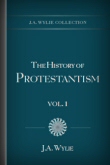
The history of Protestantism is no mere history of dogmas. The teachings of Christ are the seeds; the modern Christendom, with its new life, is the tree which has sprung from them. It is a principle which has its origin outside human society: it is a Divine graft on the intellectual and moral nature of man, whereby new vitalities and forces are introduced into it, and the human stem yields henceforth a nobler fruit. It is the descent of a heaven-born influence which allies itself with all the instincts and powers of the individual, with all the laws and cravings of society, and which, quickening both the individual and the social being into a new life, and directing their efforts to nobler objects, permits the highest development of which humanity is capable, and the fullest possible accomplishment of all its grand ends. In a word, Protestantism is revived Christianity.
Each volume of The History of Protestantism contains dozens of beautiful pen and ink drawings depicting the people, places, and events described in this highly lauded history. Volume one includes:
- Progress from the First to the Fourteenth Century
- Wycliffe and His Times, or Advent of Protestantism
- John Huss and the Hussite Wars
- Christendom and the Opening of the Sixteenth Century
- History of Protestantism in Germany to the Leipsic Disputation, 1519
- From the Leipsic Disputation to the Diet at Worms, 1521
- Protestantism in England from the Times of Wycliffe to Those of Henry VIII
- History of Protestantism in Switzerland from AD 1516 to Its Establishment at Zurich, 1525
- History of Protestantism from the Diet of Worms, 1521, to the Augsburg Confession, 1530
No more tragic and thrilling chapters of human history are to be found than those narrating the religious struggles which followed the Reformation. The heroism of the Waldenses has become classic; that of the Netherlands is less known, but is equally noble, and more bloody. Every struggle for freedom and for spiritual religion is for the entire welfare of mankind. Religious reformers have often been the greatest patriots. Dr. Wylie’s book will supply in a pleasing form, and gathered from a great variety of sources, information that will not only interest readers, but that will also imbue them with the sacred love of liberty and of truth.
—British Quarterly Review
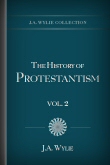
The history of Protestantism is no mere history of dogmas. The teachings of Christ are the seeds; the modern Christendom, with its new life, is the tree which has sprung from them. It is a principle which has its origin outside human society: it is a Divine graft on the intellectual and moral nature of man, whereby new vitalities and forces are introduced into it, and the human stem yields henceforth a nobler fruit. It is the descent of a heaven-born influence which allies itself with all the instincts and powers of the individual, with all the laws and cravings of society, and which, quickening both the individual and the social being into a new life, and directing their efforts to nobler objects, permits the highest development of which humanity is capable, and the fullest possible accomplishment of all its grand ends. In a word, Protestantism is revived Christianity.
Each volume of The History of Protestantism contains dozens of beautiful pen and ink drawings depicting the people, places, and events described in this highly lauded history. Volume two includes:
- Rise and Establishment of Protestantism in Sweden and Denmark
- Protestantism in Switzerland from Its Establishment in Zurich, 1525, to the Death of Zwingli, 1531
- Protestantism in Germany from the Augsburg Confession to the Peace of Passau
- From Rise of Protestantism in France, 1510, to Publication of the “Institutes,” 1536
- Rise and Establishment of Protestantism at Geneva
- The Jesuits
- Protestantism in the Waldensian Valleys
- Protestantism in France from the Death of Francis I, 1547, to Edict of Nantes, 1598
The author writes in a sprightly manner: he is by turns philosophical and picturesque, always dignified, and always clear, free from acrimony and invective, and knows how to subordinate and proportion the parts so as give to his story the unity and impressiveness of a consistent whole. It is a book for the times, worthy to be read by every English fireside through the long dark winter evenings that are before us, and, if once commenced, certain to be finished.
—London Quarterly Review
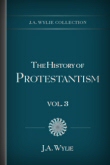
The history of Protestantism is no mere history of dogmas. The teachings of Christ are the seeds; the modern Christendom, with its new life, is the tree which has sprung from them. It is a principle which has its origin outside human society: it is a Divine graft on the intellectual and moral nature of man, whereby new vitalities and forces are introduced into it, and the human stem yields henceforth a nobler fruit. It is the descent of a heaven-born influence which allies itself with all the instincts and powers of the individual, with all the laws and cravings of society, and which, quickening both the individual and the social being into a new life, and directing their efforts to nobler objects, permits the highest development of which humanity is capable, and the fullest possible accomplishment of all its grand ends. In a word, Protestantism is revived Christianity.
Each volume of The History of Protestantism contains dozens of beautiful pen and ink drawings depicting the people, places, and events described in this highly lauded history. Volume three includes:
- History of Protestantism in the Netherlands
- Protestantism in Poland and Bohemia
- Protestantism in Hungary and Transylvania
- The Thirty Years’ War
- Protestantism in France from the Death of Henry IV, 1610, to the Revolution, 1789
- Protestantism in England from the Times of Henry VIII
- Protestantism in Scotland
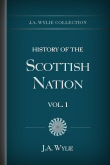
Volume one of History of the Scottish Nation covers the pre-historic, druidic, Roman, and early Christian periods of Scotland. Chapters include:
- First Peopling of Britain
- Journey of the Kymri to Britain
- Habits, Habitations, and Artos of the First Settlers
- The Stone Age
- The Bronze Age
- The Iron Age
- The Druids—The Sun-Worship of Asia and Caledonia
- Druids, Deities, Hierarchy, Doctrines
- The Druid’s Egg—The Mistletoe—The Druid’s Sacrifice
- The Temples or Stone Circles of the Druid
- The Alteins; or, Stones of Fire—Beltane, or, May-Day and Midsummer Festivals
- Vitrified Forts—Rocking-Stones—Druid’s Circle—No Man’s Land—Divination—Gallow Hills—A Yoke Broken
- Scotland as Seen by Agricola and Described by Tacitus and Herodian
- The Caledonian as Painted by Herodian
- Caledonian Houses—Lake Dwellings
- Roman Period of Britain—England Invaded by Caesar, and Scotland by Agricola
- The Battle of Mons Grampius
- Expedition of Severus and Withdrawal of Romans from Britain
- Christianity Enters Britain
- The Cradle of the Scots
- The Coming of the Scots to Ireland
- The Planting of the Scottish Nation
- Kindling of the Lamp of Iona
- Battles Political and Ecclesiastical
- Iona and Rome, or the Second Roman Invasion
- Union of the Scots and Picts—The Scottish Nation
This promises to be a noble work. Every Scotchman should read it. We began to read it, and we could not lay down the book; it held us firmly, and demanded of us that we should hear it tell its tale even to the end. We yielded; and we advise our readers to do the same.
—Charles Spurgeon, Sword and Trowel
This is a really good book; it will be generally welcomed as the most thorough, at the same time readable elucidation yet given to the world of the development of our Scottish national life in those earlier phases of it; which have had a more determinative influence than is generally supposed on all our subsequent history. Accurate in detail, it takes a wide grasp of leading principles, and masses its facts so skillfully that mind and memory are lastingly impressed without being burdened.
—Dundee Advertiser
The elaborate and skilful plan of the work, the easy mastery of details, the delicate tact shown in the grouping, and the effective development of each successive point in the story, testify to this being the mature product of a veteran who has put into the work the patient toil of many years, consecrated by the spirit of purest patriotism.
—Christian Leader
We do not go a step beyond the truth when we say, that there is not to be found in the whole compass of literature relating to our national history such an effective and accurate account of the first peopling of Britain, the journey of the ‘Kymri’ to our shores, of the habits and habitations of the first settlers, of the stone age, the age of bronze, and the iron age, and also of the Druidic period, as Dr. Wylie has with superb literary art contrived to press into the first pages of his opening volume. The volume, in many respects, is the most notable that has been given to the world by any Scottish writer for many years.
—Kilmarnock Standard
Dr. Wylie’s narrative abounds in powerful character sketches, stirring battle pieces, and glowing landscape pictures. His sense of historical perspective carries him lightly over less important events and brings into prominence those which possess permanent significance. His history is at once a work of learning and research and a narrative of fascinating interest. We doubt not it will take rank when completed with the best of its predecessors.
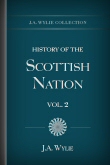
Volume two of History of the Scottish Nation covers the Celtic Christianization of Scotland. It covers the epochs of Ninian, Patrick, Columba, Columbanus, and the Culdee Church. Chapters include:
- A New Age from the North
- The Services of the Scots to Christianity in the Middle Ages
- A Second Morning in Scotland
- Ninian
- Ninian Visits Home
- Ninian Returns Home
- Ninian’s Last Labors and Death
- Palladius
- Patrick
- Patrick in Ireland
- Patrick Finds Peace
- Patrick Again at Home
- Patrick Goes to Ireland
- Patrick’s Ministry in Ireland
- Patrick’s Evangelistic Tours
- Day of Tara
- Three Hundred and Sixty-Five Churches
- Schools of Early Ireland
- Abernethy
- Columba
- Voyage to Scotland
- Organization of Iona
- Agriculture, Science, and Theology of Iona
- Columban Plan of Evangelization
- Columba’s Last Days
- The Celtic Evangelization
- The Protest of Columbanus
- Spread of Culdean Church
The first volume was invaluable, and the second is like unto it. Dr. Wylie has annihilated the St. Patrick monkish legend, but restored the true Patrick.
—Charles Spurgeon, Sword and Trowel
We cannot linger on the noble and pathetic story (Patrick and Columba), but most warmly recommend our readers to make acquaintance with it for themselves in Dr. Wylie’s fascinating pages.
—English Presbyterian Review
We have not seen in any writer, save perhaps in Montalembert, so frank and generous an acknowledgment of the splendid services rendered by the early Irish missionaries to the cause of religion in Scotland and throughout Christendom.
—Christian Irishman
He has proved beyond dispute that the work and honor of spreading knowledge, culture, refinement, and above all, the gospel, in these islands, and in the continent of Europe, belong not to Rome but to the Scoti.
—Motrose Review
Much as we relished the series of mental historic paintings in his first volume, by the careful garnering and grouping of widely isolated facts, we question if his second volume may not be more of a revelation of the unknown to the ordinary readers. He has made a valuable contribution to the sum of human knowledge.
—Scottish Leader
There can be but one opinion of the great value in a national as well as literary sense of this latest historical work by Dr. Wylie.
—Ardrossan Herald
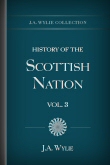
Volume three of History of the Scottish Nation covers from the union of Scots and Picts, AD 843, to the death of Alexander III, AD 1286. Chapters include:
- Union of the Picts and Scots—Reign of Kenneth Macalpin
- Donald—Constantine—First Battle with the Danes
- Eth—Grig—Pictish Persecution of Columban Church—Toleration
- Gregory of Scotland and Alfred of England—Norsemen—The Fading Columban Lamp
- Donald—Constantin—Lost Battles and Their Lessons
- Special Mission of Scotland—Synod of Scone—A Tenth Century Reformation
- Destruction of Early Scottish Literature—The Columbites Metamorphosed—Was Iona a Roman or a Protestant Church?
- Reigns of Malcolm I—Indulf—Duff—Cullen—Scotland’s One Talent
- Reign of Kenneth—Battle of Luncarty—House of Hay—Alteration of Law of Succession
- Malcolm II—Cession of Lothian to Scots—Battles of Murtlach and Barry—Kingdom of Scotia
- Duncan and Macbeth
- Malcolm Canmore and William the Conqueror
- Queen Margaret—Conference with Culdee Pastors
- Glimpses of the Columban Church in the Middle Ages—Easter—Fall of Iona
- Translations of the Chair of Columba—The One Bishop of Alban—A Great Tempest in Which Scotland Does Not Sink
- Epochs of Revival in Columban Church
- The Culdees—Their Origin—Their Functions—Their Diffusion
- Norwegian Kingdom of Orkney—Margaret Revolutionizes Scotland—Death of Malcolm and Margaret—Estimate of Margaret’s Character and Services
- Donald Bane—King Eadgar—Alexander I—Alexander’s Battle with the Bishops—Alexander’s Vow and Monastery of Inchcholm
- David I and New Age of Europe—David’s Personal Qualities and Habits—War to Restore the Anglo-Saxon Line in England—Battle of the Standard
- King David’s Ecclesiastical Policy—Erection of Five New Bishoprics—Suppression of the Culdees
- Founding and Endowing of Holyrood
- Interior of Abbey—Routine of Daily Services—Duties of the Several Functionaries—Benefit to Society?
- Founding of Abbey’s Continued—Abbey’s North of the Grampians—In Valley of the Tweed, Melrose, Kelso, Etc.—Various Orders of Friars—Outlook of Scotland
- Death of David—His Character
- Reigns of Malcolm IV—William the Lion—Alexander II—Alexander III—Battle of Largs
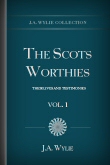
The Scots Worthies contains biographical accounts of more than one hundred important Scottish Christians, many of whom were martyred. “Martyr after martyr fell, and it seemed as if their cause was falling with them. But no, although men saw it not at first, the tide was stemmed, was turned, was rolled backwards, and yet farther backwards with every head that fell on the scaffold, till at last the change which had been long in progress was consummated and openly proclaimed in the revolution, when Presbytery was restored to the church and a free Parliament to the nation.” Both volumes of The Scots Worthies contain dozens of beautiful pen and ink drawings depicting the people, places, and events described in these short biographies. Volume one begins with the life of Patrick Hamilton in 1558 and ends with death of John Livingstone in 1672.
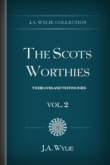
The Scots Worthies contains biographical accounts of more than one hundred important Scottish Christians, many of whom were martyrs. “Martyr after martyr fell, and it seemed as if their cause was falling with them. But no, although men saw it not at first, the tide was stemmed, was turned, was rolled backwards, and yet farther backwards with every head that fell on the scaffold, till at last the change which had been long in progress was consummated and openly proclaimed in the revolution, when Presbytery was restored to the church and a free Parliament to the nation.” Both volumes of The Scots Worthies contain dozens of beautiful pen and ink drawings depicting the people, places, and events described in these short biographies. Volume two begins with the death of John Semple in 1677 and ends with death of Robert Baillie of Jerviswoode in 1672. It also includes a section of female martyrs and confessors.
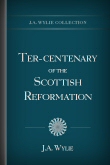
This volume contains the papers and speeches delivered at the National Commemoration of the Scottish Reformation which was held during the 300th anniversary of Scotland’s formal break from the Catholic Church. The reader will find the Scottish Reformation looked at by a great multitude of minds, and from many different standpoints, and exhibited under so great a variety of lights, both theoretic and practical, both retrospective and prospective, that under the divine blessing, this volume can scarce fail of being serviceable to the cause of the Reformation.
A series of intelligent, appropriate, and instructive papers, adapted to keep alive in the mind of Scotchmen a fitting memory of the past, and to render the future, as it should be, an improvement on the bygone.
—British Quarterly Review
The tercentary volume is altogether worthy of the occasion in which it originated.
—Eclectic Review
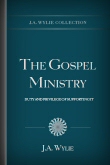
The Gospel Ministry: Duty and Privilege of Supporting It is the award winning essay for the Glasgow Prize Essays contest of 1856. J. A. Wylie sets out with the principle that God’s chief end ought to be man’s chief end, and shows that the work of God is to secure the salvation of men by the gospel, and that men must cooperate to secure this end. He then examines the patriarchal scale of giving, tithing, the ordinance of Christ, the sin of inadequate giving, and the blessedness of giving to the individual, the family, and the nation.
Dr. Wylie is a man of high and established character as an author, and this work will not only sustain but elevate his reputation as a powerful and impressive writer.
—British and Foreign Evangelical Review
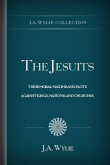
The Society of Jesus, of which the members are called Jesuits, was founded in the sixteenth century by Ignatius of Loyola. Members were active in the Counter-Reformation, which is sometimes considered a response to the Protestant Reformation. In The Jesuits, J. A. Wylie sets forth what he sees as the dangers of Catholicism’s expansion into Scotland and Ireland.
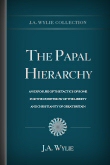
Fearing that Great Britain was straying off the path from which the Reformation had forged for it, J. A. Wylie warns of the dangers of English Protestantism’s complacency during the growth of the Catholic Church in the nineteenth century.
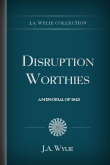
The Disruption of 1843 was a schism within the Church of Scotland from which the Free Church of Scotland was formed. Disruption Worthies: A Memorial of 1843 contains biographies of the leaders and the heroes that led the protest on May 18, 1843, or helped build up the Free Church of Scotland after its formation. Each biographical entry is accompanied by a beautiful pen and ink portrait. J. A. Wylie also provides a historical sketch of the first 40 years the Free Church of Scotland.
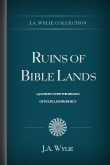
Ruins of Bible Lands is an imagined travelogue through the Bible lands meant to inspire younger readers. This journey explores the lands where the prophecy of our Lord has been fulfilled. J. A. Wylie visits the archeological digs at Nineveh and Babylon, crosses the Nile into Egypt, journeys through the ancient realm of Edom, and more.

In Pilgrimage from the Alps to the Tiber, J. A. Wylie reports on his visit to the Piedmont Valleys and to Italy. He first investigates the state of the Waldensian Church, and then studies the effects of the Catholic Church upon the trade, industry, knowledge, liberty, and general happiness of Italian citizens.
Dr. Wylie’s sketches of Austrian and Papal Italy are replete with interest.
—Athenaeum
We are presented with the gist of the Popish controversy, freshened by new and very striking examples, and lightened by amusing incident and graphic description.
—Hugh Miller
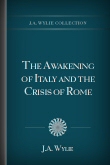
J. A. Wylie spent a year living in Italy and reports on his findings. He examines the political climate, the daily press, the literary and artistic culture, the commerce and industry, Italy’s schools, the various religious houses, and more. After reporting his travels, Wylie argues that the Catholic Church is responsible for the country’s slow economic and intellectual growth.
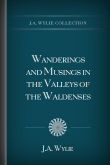
Most publications on the Waldensians have had a main, if not an exclusive, reference to the people; this volume aims at being a photograph of the country. It is “The Valleys,” the scene of so many heroic achievements, and of so many sublime martyrdoms, which J. A. Wylie conjures forth in the pages of Wanderings and Musings in the Valleys of the Waldenses. “The scenery of these valleys is of unrivalled magnificence. On that ground alone the interest that belongs to them is great; but that interest is much enhanced by the moral halo that surrounds them.”

In this exposition of the Book of Revelation, J. A. Wylie focuses primarily of the pouring out of the Seventh Vial. In magnificence and terror the judgment of the Seventh Vial stands alone. It possesses a marked pre-eminence over every other judgment in the volume of prophecy. Its vengeance will be on a scale that shall surpass all that went before it since the world was destroyed by water, and all that shall come after it till the world shall again be destroyed by fire. Viewed in all its comprehensiveness as the closing act of a great drama, began so early as the days of Daniel, and ever since has been advancing step by step to its consummation, it will form the most finished demonstration of God’s power and justice of which the earth has been the scene, or guilty man the object.
A writer evidently of ability, heartily in earnest on his subject himself, and heart-stirring to his readers.
—E. B. Elliot, Vindiciae Horaria
We are much mistaken if it do not produce an extensive influence upon the thinking of the age, on subjects appertaining to prophecy.
—British Banner
As a seasonal antidote to the transcendental treatment of Scripture, we hail the volume before us with peculiar satisfaction. We are greatly mistaken if it does not lead the way to a more healthy and satisfactory mode of resolving the mysteries of this book than has ever yet been adopted.
—Free Church Magazine
This book is characterized by profound veneration for the authority of the Bible, a calm, and even severe judgment, a competent intimacy with the history of nations, a flowing, yet manly and classic style, and a richness of descriptive power which transfers to the mind of the reader the images that are passing before that of the eloquent writer.
—Universe
The attention, which is at once engaged by its graceful diction and eloquent style, is fixed and deepened by the manifestations of biblical knowledge, historical research, logical closeness of reasoning, and earnestness of religious principle and feeling, which are throughout apparent.
—London Watchman
We have read this volume with an interest we cannot express; and in our reading on the great subject to which it refers, and which has for forty years appeared to us one of commanding importance, we have met with no book which has so entirely commended itself to our judgment. The Christian Church will feel itself to be under deep and still deeper obligation, in proportion as his work becomes known.
—Oxford Chronicle
The most elaborate, the best written, and decidedly the most satisfactory treatise on the subject.
—Banner of Ulster
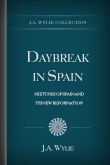
Following the fall and expulsion of Isabella II, J. A. Wylie spent two months in Spain and documented the spread of Protestantism throughout the country. “Springing from the prison of Granada, to which but a few years ago it was confined, it now presents itself to the world an organized church, with schools and public sanctuaries, and authorized worship, attended by thousands of Spaniards, the first fruits of a morally and spiritually regenerated people.” Contains a dozen beautiful pen and ink drawings depicting various places Wylie visited.
This is decidedly one of Dr. Wylie’s best works, and likely to prove most successful.
—British Evangelical Review
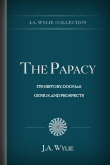
The history of the papacy, the office held by the pope as head of the Catholic Church, spans from the time of Saint Peter to present day. J. A. Wylie divides his critical work on the office into four parts: “History of the Papacy,” “Dogmas of the Papacy,” “Genius and Influence of the Papacy,” and “Present Policy and Prospects of the Papacy.”
This able and finished production combines at once the rare qualities of clear statement, vigorous logic, and eloquent style. Its tone and spirit are worthy of an Evangelical Alliance, and it is to the praise of the author that he could write upon a subject on which the public mind has been so excited, and we may say so exasperated, with such an absence of all passion and prejudice.
—Baptist Magazine
Dr. Wylie’s volume is learned, philosophical, and eloquent.
—British Quarterly Review
One of the most massive and masterly productions in our literature on the subject.
—General Assembly of the Free Church of Scotland
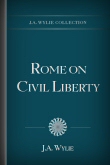
Of all earthly possessions, liberty is the most precious: it is bought at a greater price, and preserved with greater watchfulness, than any other. In Rome on Civil Liberty, J. A. Wylie examines the political and spiritual ramifications of the Catholic Emancipation in the late eighteenth century and early nineteenth century in Great Britain and Ireland.

In Scenes from the Bible, J. A. Wylie provides commentary on more than 30 of the most interesting scenes presented in Scripture. Intended for a younger audience, Wylie uses word pictures to flesh out the scenes and to help the readers attain better mental images of some of the Bible’s most memorable moments.
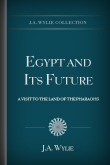
When Abbas I succeeded his uncle Ibrahim Pasha in ruling Egypt and Sudan in 1848, many wondered which direction the country take. J. A. Wylie traveled to Egypt, and Egypt and Its Future is the travelogue of his journey. Wylie depicts the people and places in great detail, and offers specific ideas for moving the country forward into modernity.
Egypt itself, the land of the Pharaohs, is presented in such clear and graphic terms as if it stood out in a picture to the actual vision of the reader. Its soil, its people, its laws, even its dogs, and, above all, its monuments of hoary antiquity, which connect the present with a far distant past—all are made to pass successively under review.
—The Record
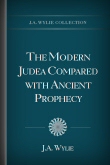
This volume is divided into three areas of study. It contains a picture of Palestine and the countries immediately adjoining which were the subject of ancient prophecy, it contains an elucidation of prophecy, so far as relates to Judea and the neighboring countries, and it shows the great physical and moral changes which these countries are destined to undergo, from their own capabilities and the predictions of the Divine Word. Wylie begins by examining the internal evidences of the Bible and exploring the characteristics of Old Testament prophecies referring to Judea.
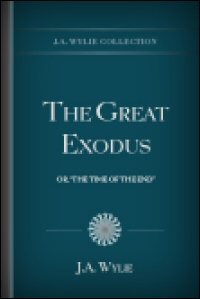
The Great Exodus, or, “The Time of the End”
- Author: J. A. Wylie
- Publisher: Andrew Elliot
- Publication Date: 1892
- Pages: 408
The Great Exodus begins with the chapter “The Use and Abuse of the Study of Prophecy,” where J. A. Wylie warns that only God can really foresee the future. “If, from interpreting prophecy, he shall fall to prophesying, it is not difficult to foretell the result: he will wander from light into darkness.” This is followed by a study of the different methods of interpreting prophecy by the Reformers and that of the German schools of the nineteenth century. Wylie then examines the Book of Daniel and the Book of Revelation.
This work is not only one of great ability, but it is in many respects a remarkable production: it is so with regard to the amount of research which is everywhere visible in its pages; it is, too, a remarkable work viewed in relation to the hypothesis, if we may use the word, which the volume develops, and which is so ably supported. It is one of the most interesting and valuable which has appeared for a long time past on the subject of prophecy, and is destined to occupy a permanent place in the category of our Protestant theology.
—London Morning Advisor
Dr. Wylie pursues the historical method with all his well-known ability and eloquence, and has furnished us a very pleasant edifying volume.
—British and Foreign Evangelical Review
The present volume deserves careful study, and will enrich the minds of those who desire an enlarged acquaintance with the intensely interesting subjects of which it relates; and we could wish all our readers to participate of the enjoyment which we ourselves had in examining its varied contents.
—Original Secession Magazine
About J. A. Wylie
James Aitken Wylie (1808–1890) was born in Kirriemuir, Scotland, and educated at the University of Aberdeen. He was ordained in the Original Secession Church in 1831, served as minister of Original Secession Congregation at Dollar from 1831 to 1846, and joined the Free Church of Scotland in 1852. He helped edit and published over 800 articles in The Witness and later was editor of the Free Church Record. From 1860 to his death he lectured at the Protestant Institute of Scotland, Edinburgh. He passed away just after completing the third volume of The History of Scotland.
Reviews
1 rating


Josh Watkins
7/23/2017
I bid on this is October 2016 and I am still waiting. I hope this gets published soon. I would really like to read this collection.
John Miller
11/4/2015
I'd love to see this finally get published in the Logos ecosystem! It's moving so slow though on community pricing...